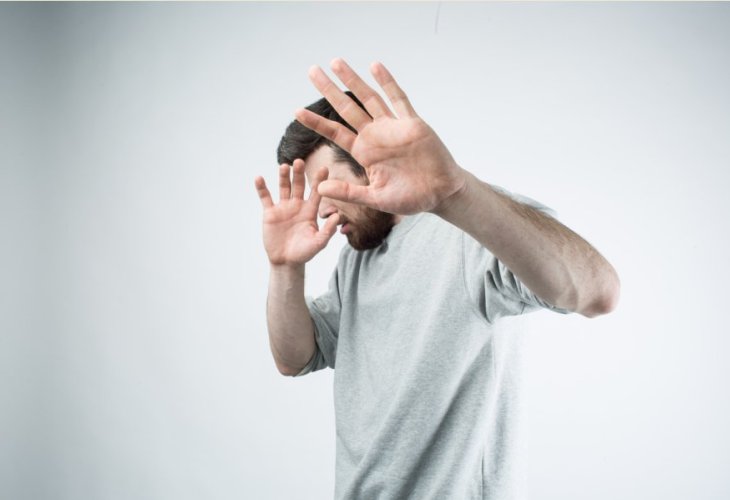Parents and Children
The Torah Draws a Line: No Hitting, No Excuses
Striking a fellow Jew violates Torah law, even if you were wronged. Striking one's parent is a capital offense
 (Photo: Shutterstock)
(Photo: Shutterstock)The Torah forbids hitting any Jew, no matter who they are. Striking someone physically is not just bad behavior — it’s a Torah violation. A person who does so has transgressed a negative mitzvah and would have been liable for lashes when the Rabbinical courts had that authority.
This law applies no matter what the circumstances. Whether the person is angry, provoked, or seeking to discipline someone, physical violence is forbidden by the Torah.
Even Raising a Hand Is Wrong
The Talmudic Sages went to some lengths to emphasize how serious this prohibition is.
Reish Lakish taught: If someone lifts their hand to strike another person, even if they don’t follow through, they are already considered wicked. He derives this teaching from the Torah verse which quotes Moshe Rabbeinu who witnessed a Jew striking his fellow: “Why are you striking your fellow?”
The verse does not state, “Why did you strike,” but rather “why are you striking,” showing that even the threat of violence is sinful.
Other Sages added their own condemnations of a person who engages in physical violence:
- Such a person is considered a sinner.
- The only atonement for such behavior is death.
- Striking a fellow Jew is like striking the Divine Presence.
Striking a Parent Is Even More Severe
If someone hits their father or mother, they violate not only the basic prohibition against striking a fellow Jew, but also an additional Torah mitzvah.
The Torah states explicitly: “One who strikes their father or mother shall surely be put to death.”
This applied only in the time of the Temple, and only if the strike caused bleeding. In that case, the punishment was death by strangulation, the same as for extremely serious crimes like murder. If there was no bleeding, the person would be punished with lashes.
For example, if someone hit their parent on the ear and caused deafness, they would be held fully liable, as deafness from a blow implies that some internal bleeding must have occurred.
What If a Parent Hits the Child First?
Even if a father hits his son unjustly, the child is still forbidden to strike back. Instead, he should walk away and remain silent, not out of fear of the parent, but due to his fear and awe of God who commanded this mitzvah. After all, if a human king ordered us to undergo something painful, we wouldn’t dare defy him. All the more so with the King of the Universe.
That said, the son does not need to stay and accept being hit. He should quietly leave so his father doesn’t continue to violate the Torah himself. And if there’s a real threat to the son’s life, he may defend himself, even if it means striking his father to save himself.
Medical Treatment That Might Draw Blood
What if a parent needs medical help that could cause bleeding and the son is a skilled doctor? Even if the parent gives permission for the son to go ahead, the general rule is that he should not draw blood from a parent. This includes blood tests or removing splinters — anything that might cause bleeding, even if done gently and for a good reason.
If a parent needs a daily injection, and it’s difficult or expensive to arrange for someone else to do it, the son may give the injection, but only if it doesn’t cause bleeding. Most routine injections into the muscle or tissue don’t draw blood, but great care must be taken. If the injection is into a vein (which does cause bleeding), then the son should not do the injection himself.
Either way, the son should ask the parent for forgiveness before giving the injection, in case any pain is caused.
If a son sees his father has fainted and needs to rouse him, he may slap or tap him if that’s the only way to help — but if no one else is nearby who can do it fast enough.
What If a Child Hit a Parent When They Were Little?
A child who hit a parent as a young child (under the age of nine, as this is the age at which a certain level of understanding is attained) doesn’t need to do formal teshuvah (repentance), as he or she was incapable of fully appreciating the gravity of the action.
Nonetheless, when the child reaches the age of bar mitzvah, he or she should review and take special care with the mitzvot of honoring parents.
What they shouldn’t do is fast or take on harsh penances that would interfere with their ability to serve Hashem. There is nothing more powerful for spiritual repair than learning Torah itself.
A Final Thought: Respect in All Its Forms
The Torah’s laws about striking a fellow Jew — no matter who — remind us how deeply Judaism values human dignity. Our hands are meant to help, not harm. Even when we’re angry, even when someone else is in the wrong, we are called to rise above instinct and act with self-control and respect. These halachot are not just legal boundaries — they’re a guide for how to live with compassion, honor, and restraint.

